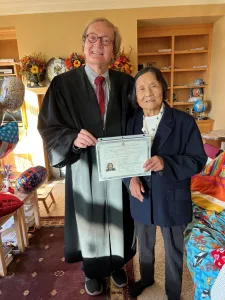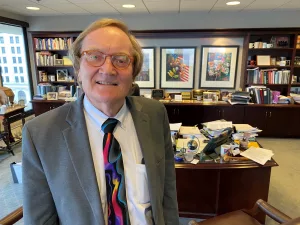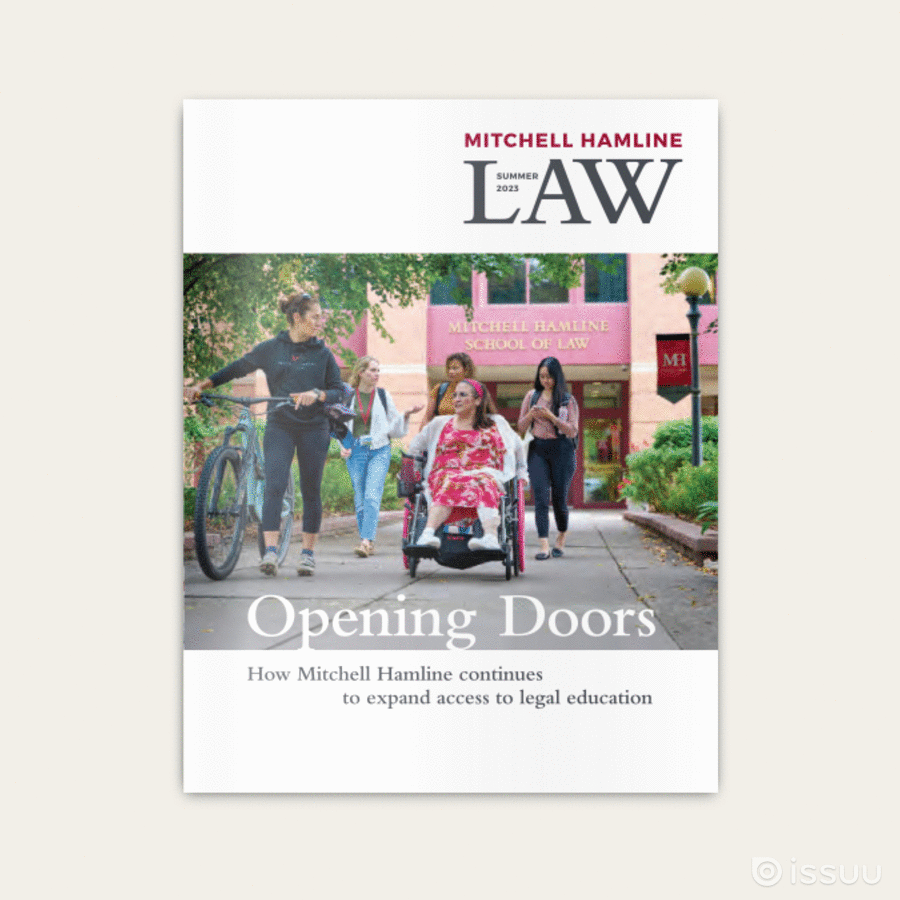
Judge Donovan Frank with Zhengfang Liu, shortly after she was sworn in as an American citizen (provided photo)
Zhengfang Liu lived in the United States for 20 years before becoming a citizen last year. But because of the 82-year old’s declining health, including four hospitalizations and a cardiac arrest in the past year, Liu couldn’t attend a naturalization ceremony in person.
So the ceremony went to her, in the person of U.S. District Judge Donovan Frank ’77.
Frank, who is also a Mitchell Hamline trustee, packed his judge’s robe and necessary paperwork and drove to Liu’s home in Rochester, Minn. With family gathered around, Frank administered the Oath of Allegiance in the living room.
Liu’s son, Hao Wang, said it was his mom’s dream to become an American. “She is very proud of it,” he said. “We greatly appreciate Judge Frank!”
In most cases, new Americans take their oaths in groups at large venues, where an atmosphere of joy permeates as families snap photos and shed tears of happiness for their loved ones. But some people are physically unable to attend or can’t wait until the next ceremony. A military member with imminent orders. A pregnant woman hospitalized with a heart condition. Or, in most cases, someone who is terminally ill.
About a year after becoming a federal judge in 1998, Frank became liaison for emergency proceedings in the District of Minnesota.
When U.S. Citizenship and Immigration Services learns of an applicant who needs an emergency or homebound ceremony, they contact Frank’s office to arrange a time. Frank has administered the oath at bedsides, in hospital rooms, and even in his chambers. Fellow judges enthusiastically step in when he’s unavailable.
Now aged 72 and a senior judge, Frank enjoys the role too much to give it up.
“I can’t capture for you what it means for the families, the new American, and for me to be in those situations,” said Frank. “Many times, I’m there because the person is close to death, and it’s their last wish to die an American.
“It’s one of the truest privileges of my life.”
It’s also rare. Of the thousands of people who become citizens each year, Frank estimates he’s performed fewer than 50 homebound ceremonies in 25 years on the bench.

Judge Donovan Frank, in his chambers in St. Paul
Looking out on the Mississippi River from his chambers in the Warren Burger Federal Courthouse in St. Paul, Frank points to the spot in the room where a soldier born in Somalia became an American so he could deploy to Afghanistan.
Frank asked the soldier why he’d fight for a country where some people think he should just go back to Somalia. “This country saved my life,” Frank recalled the soldier saying. “This is my way of saying thank you.”
Amidst a bevy of photographs throughout his chambers are several from these ceremonies, which Frank says are some of the truest moments of him living his oath as a judge—to administer justice without respect to persons and do equal right to the poor and to the rich.
Once the oath is done, by law that person is an American—regardless of how long it takes to process the paperwork. That’s the moment when Frank says the same thing at every ceremony:
“The United States of America is now a better country than it was a few moments ago before you became a citizen.”

